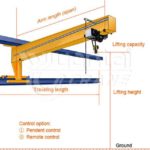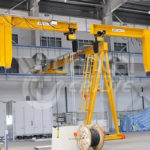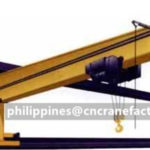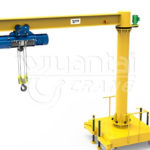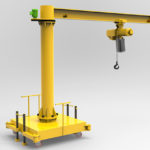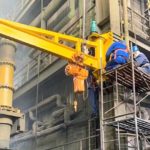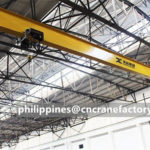Workshop Stationary & Portable Jib Cranes &Mobile Jib Cranes for Sale
A Jib crane is a small lifting equipment generally installed in a workshop and warehouse, the working range of the jib crane is limited but it has a very obvious advantage during production, it can rotate motorized and manually from 180 degrees to 360 degrees, and the working area is a circle. Due to its small body, taking up little space and easy installation and operation, the jib crane is popular with clients. As for the jib crane, the most important is to make the foundation, Yuantai will provide the foundation drawing and the detailed procedure of making the foundation to clients, according to the drawing and procedure, the foundation is not a problem. There is another type of jib crane which doesn’t need to make foundations, but it has the same function as the jib crane, it is a portable jib crane with a base plate and wheels, the wheels are fixed when it is lifting and handling when it is moving, the lifting and handling work should be stopped, in other words, moving, stop lifting; lifting, stop moving; use wheels to instead of foundation, portable jib crane is in need by some special working condition;
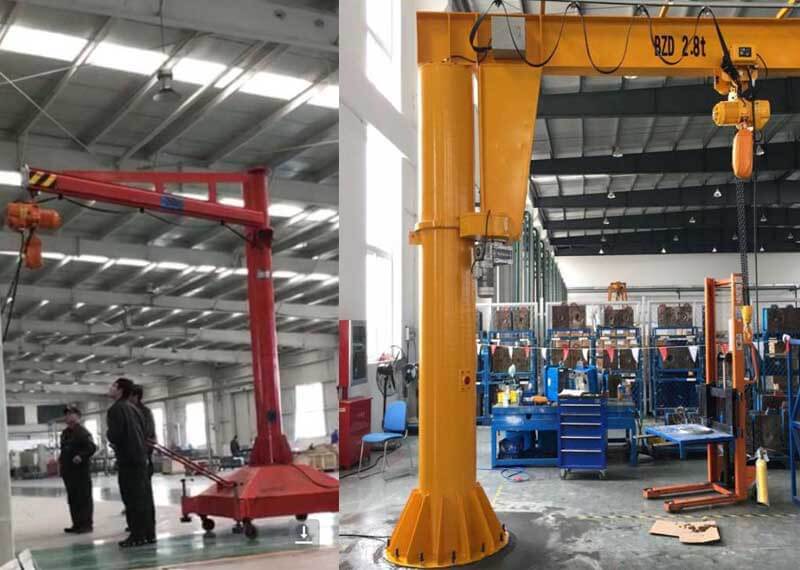
So far, the max lifting capacity of stationary jib crane Yuantai can supply is 16ton, generally, the lifting height and arm length are not more than 6m, of course, Yuantai can customize the nonstandard jib crane according to different needs; while the max. The lifting capacity of a portable jib crane is 2 tons, and the lifting height and arm length are not more than 4m.
Advantages of Portable Jib Cranes/Mobile Jib Cranes
Here are the main advantages of portable and mobile jib cranes:
- Versatility and flexibility: Portable jib cranes and mobile jib cranes are used in a wide range of applications, such as construction sites, warehouses, machine shops and garages. Portable and mobile jib cranes can handle many lifting tasks, such as lifting materials, positioning equipment and performing maintenance work.
- Low Price: Portable jib cranes and mobile jib cranes use less material and are a more affordable option, especially for temporary lifting needs. The mobility of portable and mobile jib cranes is simple and easy to install, saving a lot of installation costs.
- Easy to use: Portable jib cranes are lightweight and can be assembled/disassembled quickly without the need for special tools. Mobile jib cranes have user-friendly controls for quick start-up operation.
- Space-Saving Design: Unlike overhead cranes, portable jib cranes and mobile jib cranes do not require large overhead clearance, making them suitable for areas with limited height.
- Safer: Portable jib cranes and mobile jib cranes are equipped with safety features such as overload protection and limit switches to prevent accidents and ensure safe operation.
The Two Main Categories of Workshop Jib Cranes
Jib cranes can be broadly categorized into two primary types: stationary jib cranes and portable jib cranes. Each category offers distinct benefits and caters to specific workshop needs.
1. Workshop Stationary Jib Cranes: A Permanent Lifting Solution
Workshop stationary jib cranes provide a permanent lifting solution, securely anchored to the floor or a wall. They are constructed from robust materials like steel and can support a wider range of weight capacities compared to portable models. Here’s a closer look at the different types of stationary jib cranes:
- Freestanding Jib Cranes: These self-supporting cranes have a vertical column fixed to the floor, offering 360-degree manoeuvrability of the boom.
- Wall-Mounted Jib Cranes: As the name suggests, wall-mounted jib cranes are affixed directly to a sturdy wall, ideal for maximizing floor space. They typically have a limited reach but are well-suited for repetitive lifting tasks close to a wall.
- Mast-Mounted Jib Cranes: Designed for heavy-duty lifting, mast-mounted jib cranes feature a tall mast that supports the boom, providing a significant lifting height and outreach.
Choosing the Right Stationary Jib Crane:
Selecting a workshop stationary jib crane requires careful consideration of several factors:
- Lifting Capacity: Determine the maximum weight you’ll need to lift regularly. Stationary jib cranes typically have higher capacities than portable models, ranging from a few hundred pounds to several tons.
- Reach and Height: Evaluate the required horizontal reach and vertical height needed for lifting and manoeuvring materials within your workspace.
- Work Area: Consider the available floor or wall space for installation and ensure the chosen jib crane’s boom movement doesn’t obstruct other equipment or workflows.
- Duty Cycle: Select a jib crane that aligns with your workload demands. Light-duty cranes are suitable for occasional lifting tasks, while heavy-duty models are built for frequent, intensive use.
2. Portable Jib Cranes: A Flexible Lifting Option
Portable jib cranes offer a more flexible lifting solution. They are designed to be easily moved and positioned within your workshop or even transported to different work locations. Here are some common types of portable jib cranes:
- Folding Jib Cranes: These cranes have a folding arm that can be collapsed for compact storage and transportation. They are a great option for occasional lifting needs.
- Free-Standing Mobile Jib Cranes: Equipped with a wheeled base, these cranes provide excellent manoeuvrability within the workspace. They offer a good balance between portability and lifting capacity.
- Forklift-Mounted Jib Cranes: These cranes attach to a forklift, transforming it into a mobile lifting unit. They are ideal for workshops that already utilize forklifts for material handling.
Choosing the Right Portable Jib Crane:
When selecting a portable jib crane for your workshop, consider the following factors:
- Lifting Capacity: Portable jib cranes generally have lower capacities than stationary cranes, typically ranging from a few hundred pounds to a couple of thousand pounds.
- Boom Length: Choose a boom length that offers sufficient reach for your lifting tasks while maintaining portability.
- Maneuverability: Consider the type of base (wheeled, fixed) and its suitability for your workspace layout and desired mobility.
- Ease of Use: Portable jib cranes should be easy to set up, operate, and move around.
Summarize the Factors to Consider Before Purchasing Jib Cranes
- Application Site: If floor space is limited, a wall-mounted or portable jib crane may be more suitable. For larger workshops, freestanding stationary cranes can provide greater positioning flexibility.
- Lifting Requirements: Calculate the weight, height, and reach required for regular lifting tasks. Choose a jib crane with a capacity that exceeds your maximum expected load.
- Frequency of use: For occasional lifting needs, a manual or low-capacity crane may be sufficient. For frequent or heavy lifting, consider an electric or higher-capacity crane.
- Portability Needs: If mobility is critical, a portable jib crane is the best choice. Choose the type that best suits your workspace and lifting tasks.
- Budget: Jib cranes come in various price ranges, depending on factors such as capacity, scope, features, and brand. Determine your budget ahead of time and choose a crane that provides the basic features you need without blowing your budget.
- Lifting mechanism: Jib cranes often work with a hoist, a lifting device similar to a Chain Hoist or a Wire Rope Hoist. Choose a hoist with compatible capacities and lifting heights to match your jib crane’s capabilities.
- Power source: Jib cranes can be manually or electrically operated. Manual cranes are suitable for lighter loads and less frequent use, while electric cranes offer greater efficiency and precision, especially for heavier loads or frequent lifting tasks.
- Safety Features: Always prioritize safety when using lifting equipment. Make sure the jib crane you choose complies with safety regulations and has features such as overload protection, limit switches and emergency stops.
- Maintenance needs: Regular maintenance is essential to ensure safe and reliable operation of jib cranes. Choose a crane with simple maintenance and easy-to-replace parts.
Come and Get a Free Inquiry
Our Yuantai Crane Company has been exporting bridge cranes, gantry cranes, jib cranes and electric hoists to the Philippines and other major Southeast Asian countries as well as countries around the world for more than ten years. We have very rich experience and a green manufacturing industry chain. contact us to get free crane solutions and quotations, and look forward to our friendly cooperation!
